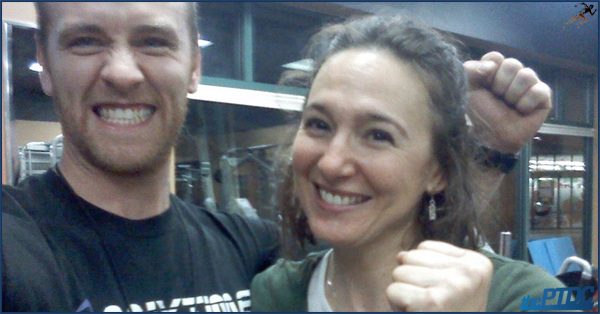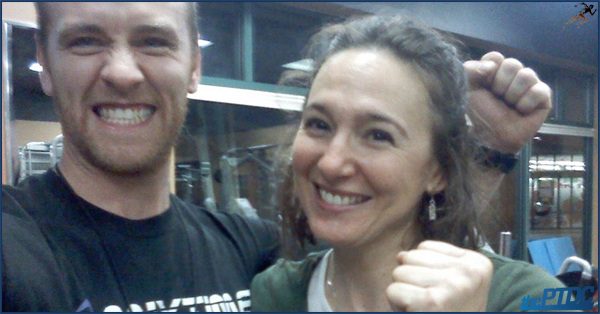I was sitting at my desk crouched over my laptop, frantically punching keys trying to wrap up off-season programming for one of my athletes.
Bing-Bing.
Bing-Bing.
Concentration lost. I sat up, took in the deep aroma of my coffee, and downed cup number two before reaching for my phone.
Athlete: "Hey coach, did I tell you about my dad?"
Note: (We'll call "dad" Brian)
Uh oh, I thought.
Me: "No, what's going on?"
Athlete: "Brian fell off a ladder taking down Christmas lights and shattered his hip. He's in his 60's and is having a hard time with his rehab. I think he should start training with you to build up some strength and mobility again."
How would you react to the situation? Would you....
Jump at the chance for another client, knowing there is a lengthy process and some serious cash in it for you?
Or would you refer out to a physical therapist while realizing full well that you may be losing business?
My background is working with athletes looking to take their game to the next level and clients focused on improving body composition, not post-rehabilitation.
Although I'm knowledgeable and capable with most-post rehabilitation situations, I entered the situation with little hands on experience or detail of Brian's injury, surgery, and rehabilitation protocols.
While it's always a financial risk to let clients walk out the door, it's better for the clients' long-term success and professionally correct.
So what did I do? I referred Brian to a great physical therapist and in most cases, you should too.
From a business owner and coaches perspective it's tough referring clients elsewhere. It's a financial risk in a fairly topsy-turvy business. With that in mind, most coaches don't refer out and instead, attempt to be a jack-of-all-trades.
In most cases you've taken continuing education on all the tasks, and perform assessments on clients.
Problem is, you're probably not trained enough to diagnose nor treat dysfunction and true medical issues.
Rather than taking these circumstances as a shot to your professional ego, take the time to build your network and refer out whenever it best suits your client's needs.
Here's how to start the referring clients out...

Build Your Professional Referral Network
In the story above, the physical therapist I referred Bryan to happened to be a therapist I met at a Christmas party at our facility.
While this is probably different from most networking situations, it's vital to take time to network with other health and performance practitioners.
Building a network including, but not limited to:
- endocrinologists
- testosterone therapy clinics
- chiropractors
- orthopedic surgeons
- soft tissue therapists (M.A.T., A.R.T.)
- physical therapists
- other strength coaches
- nutrition coaches (and niches within each one)
Take time and research local experts and reach out to shadow or observe them during the day. Or meet for coffee and get to know them on a professional level.
Take time to understand the expertise of their professions and if you believe in their service, pay for it. This proves that you believe and care about their services. If you support them, you may gain a referral network or even a new client.
Building your professional network and exploring other services builds respect and gratitude amongst your peers in the industry while simultaneously providing more business options for your clients.
It may appear you're losing business in the short term, but actually you're building back-channel relationships with other practitioners to support your business for the long-term.
If you want to be world class, you need to build a World Class Network Personal trainers, physical therapists and strength coaches all have the knowledge and expertise on paper to make some drastic changes to their client's physical prowess in the weight room and playing field.
That said, there are experts within particular niches that will optimize results for your clients.
Take time to continuously network and reach out to other professionals and find out what their specialties are. Do some homework on their practice and make sure their accreditation are up to the level you want to associate your business with.
Remember, every reference or referral is a reflection on your business and professionalism"”make sure you you're network is top-notch when referring out.
Make Your Intentions Clear With Other Professionals
When referring your clients out, communicate with the coach or practitioner to set expectations for each other and the client. A one-way street without reciprocal referrals is no fun and bad for business. Stay in contact throughout the process to make sure your client is getting great results and happy with the service provided.
When Referring Out, Explain "Why" To Your Clients:
Many times clients don't understand why you choose not to work with them in referral situations. This isn't bad, rather a time to show empathy, expertise, and create a "buy-in" with your clients.
Explaining why creates buy-in and separates you from other coaches and trainers while simultaneously showing your clients that referring out is paramount to their success. Yes, you can use anatomical and complex terms in explaining your rational, just make sure your speaking benefits rather than endless jargon.
In the end, you'll increase your value and improve your clients' results.
Benefits Of A Great Professional Referral Network:
- Better Results for your clients:
When it comes down to it, you're not a coach because of the money. Your ability to get up at 5:00 am and help your clients stems from your desire to help others improve their life through fitness.
When it comes to helping your clients, building a network and referring to qualified professionals should the need arise is an imperative piece of your practice. Not only will your clients be thankful, you'll likely receive more business and referrals on the back-end.
- Build a larger network:
Dozens of marketing experts have said, "Your network becomes your net worth." In the case of coaches and trainers, a larger network opens up more possibilities to better service your clients and builds relationships with like-minded individuals.
Your network is extremely valuable and can become a huge source of referrals and professional growth in the future, whether it's for speaking engagements or new job openings.
- More back-channel sources of clients for you in the future:
Your network is valuable and can become a huge source of referrals and professional development down the road. Build now, benefit later.
- Potential "free" services on the backend:
This is no guarantee, but referring out to soft tissue therapists, PT's, and the like may lead to free services to you or your clients on the background. This shouldn't be a driving motivation, but I've received thousands of dollars worth of chiropractic work, soft tissue therapy, and other services for sending client referrals. Note: I've also paid for thousands of dollars worth.
- Improve the sports performance, health, and fitness industries as a whole:
Let's be real, there is a ton of bickering back and forth of every conceivable issue in our interrelated industries. Even more troubling, the urge for a quick buck leaves too many people abandoning their integrity and selling out at any cost. As a result, there isn't much trust in the fitness industry and huge gaps in service. Use this as an opportunity to improve the industry.
Circling back to the story, Brian concurrently sees the physical therapist once per week and trains with me twice per week. Not only is his functional capacity improving, so is his strength and quality of life.
Building a vast referral network of health professionals and practitioners is great for growing your business and more importantly, the success of your clients. Take action today by reaching out to professionals in your area and start networking to building relationships.
What to Read Next?
The assessment process is a complicated and controversial issue.
What kind of assessment should you do? Should you even do an assessment?
In Most Personal Trainers Shouldn't Do Assessments PTDC head coach Jonathan Goodman and Reknowned physiotherapist (ex. Boston Red Sox pt) discuss where a trainer's responsibilities lie. Read it here.
Some other recommended readings are linked below:
Ignite the Fire: The Secrets to Building a Successful Personal Training Career - Jonathan Goodman
The Uncomfortable Truth About Getting More Personal Training Clients - Brett Jarman
How to Get Personal Training Clients - Jonathan Goodman










